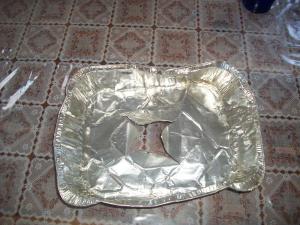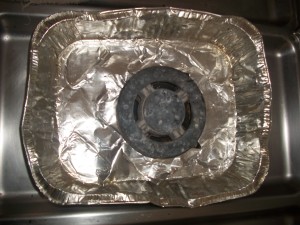I recently answered the question about how we’re adapting to the differences in availability of certain foods since we arrived in Israel from a philosophical perspective. Today I’ll answer the nitty gritty details. 😛
>>How are you finding the price differences in food?<<
Food prices are for the most part higher here on just about everything but fruits and vegetables. When you take into account that the average Israeli salary isn’t as high as in the US, food costs make up for a much higher percentage of income here.
But even in the US, I wasn’t buying food at retail prices; I had discounted sources or bought on sale for just about everything. Therefore, I was able to feed our family of 11 a high quality diet on $650 a month. Our budget hasn’t drastically changed – we’re budgeting 2000 shekels a month for food ($555) and so far this is working out very nicely for our family and the guests we have almost every week – but we’ve had some shifts in what we’re eating. I’m including prices of some basics since I was asked about that in the comments section of a previous post.
If I mention a price and you’d like to figure out what it would be in dollars, the conversion rate is currently 3.6 shekels to the dollar; 2.2 pounds equals a kilogram, and 4 liters is about a gallon. (Yes, I stand there in front of the display shelves in the supermarket doing these calculations in my head to figure out if things are a good buy! I fortunately have to do this less and less as time goes on, though.)
Dairy – We used to use lots of butter, raw milk, homemade yogurt (from raw milk), kefir, organic cottage cheese and sour cream, and small amounts of hard cheese. Now, we’ll occasionally have some butter or pasteurized milk, or maybe a yogurt or two, but dairy is no longer a staple in our home. I can’t stand that soy fillers are added to ground meat and cheeses here to make them cheaper (this was a surprise to me the first time I looked at a package of frozen chopped meat that was on sale), so you have to really, really read the labels to be sure you’re getting what you think you are.
On a related note: I was invited to a party last week at which I was the only English speaker, and when I looked at the so-called natural juice on the table, I saw it had artificial stabilizers added. I chose to drink water instead, but the woman next to me asked me why I put the juice down. I told her, and since everyone else at the table was listening, they showed me the ‘no artificial colors or preservatives” claim on the front, and then one of them turned the bottle around to show me where it said it in English (in case I didn’t get the point!). I turned the bottle to the ingredients and showed them – in Hebrew – the problematic ingredients. They couldn’t believe it. Lesson – you must read labels carefully!
Back to dairy. The least expensive cheese that doesn’t have soy fillers in it is about 42 shekels a kilo when bought at the counter (ie not prepackaged, so it’s the cheaper way to buy). Milk is between 4.50 – 5 shekels a liter. Butter is about 7.50 shekels for 200 grams. An individual unsweetened yogurt (150 – 200 grams) is about 1.20 – 2.35 shekels, depending on the fat content (sour cream is on the higher end of this price). Cottage cheese is 5 shekels a container on sale; I don’t remember how many grams this is, maybe 250 (I haven’t yet bought it) but it’s about a cup. These prices aren’t for organic or raw dairy products.
I’ve been unable to find raw cow’s milk, and the raw goat’s milk I’ve found is quite a drive from here. I had a discussion with someone who raises goats and sells raw milk, but she was very adamant that it should be pasteurized before drinking. She had some good points, basically about the importance of knowing not only the person who raises the goats, but each goat itself to see how it’s feeling that day to determine if there might be any infection that would transfer to the milk. In any case, I don’t have a vehicle and renting a car to get milk once in a while would be a big expense. (The cost of the raw goats milk was 7.5 shekels a liter.) So due to cost and quality concerns, I’ve chosen to drastically minimize dairy, to the point of just about eliminating it.
Eggs – I used to buy pastured eggs directly from the farmer for an amazingly low price and used them very freely – it was common to go through two dozen eggs just at breakfast. Here for non-pastured eggs I’m paying 27.50 shekels for 2.5 dozen non pastured eggs. Organic eggs are much, much more. We still use plenty of eggs, but closer to thirty dozen a month instead of sixty dozen.
Chicken/meat – Though we’ve cut down on the eggs and dairy, we’ve switched to more poultry. This is an area where I think we are able to compensate a lot for the nutrients we used to get in milk and eggs. I buy a lot of chicken giblets, a very nutritious organ meat, and use it almost daily for lunch (purchased on sale for 7 – 8 shekels a kilo). We usually have chicken on Shabbos (the price of chicken varies drastically by kosher certification, ranging around 10 – 28 shekels a kilo for a whole chicken).
A lot of the beef in Israel is raised in Argentina, where the vast majority of animals are pastured. I buy this once a week for Shabbos (when I can get it on sale for 3 kilos for 100 shekels).
Liver – I wrote a while back about my experience kashering liver. After undertaking to kasher 20 pounds of beef liver, I was so burnt out that I didn’t reattempt it once we used up that huge batch. However, in light of the lack of raw milk and high quality eggs, liver is again reentering the picture in our home. 🙂
Dd17 bought a two handled rectangular grill thingy that I can kasher the liver with on our stovetop when she was in Jerusalem a couple of weeks ago – there was nowhere in our city that they’re sold and I was really happy she was able to find it! (Liver is very bloody and since Jews are forbidden to eat even a drop of blood, liver has to be roasted in a special way to ensure no blood is left in it before eating – this is called kashering.) We kashered the first one kilo batch of chicken livers a few days ago, and it went pretty quickly, so last week dh picked up another four kilos. By purchasing these on sale, I pay between 18 – 20 shekels a kilo. (If you buy them kashered, the price goes up to around 100 shekels a kilo.) This isn’t something that we need to eat lots of since nutritionally a little goes a long way; I’m planning to use about a kilo of liver a week for our family.
Broth – We are able to buy chicken bones for 4 shekels a kilo on sale, and usually have a pot of broth in use in some way. We use this as a basis for soup, grains, and of course, with dh being on GAPS for over 1.5 years, broth is a staple for him. In the winter I particularly enjoy drinking it instead of hot tea.
Fats – This was the thing that took me the longest to come up with some good choices after we moved and caused me the most frustration. In the beginning had to use regular oil (soy and canola) from the store. That was the worst since we haven’t had things like that in our house for five or six years and I think they’re nutritionally damaging, versus less than ideal. We used a lot more extra virgin olive oil during this time than usual. Fortunately, we now have palm shortening for most baking and cooking (9 shekels a kilo).
I bought beef fat for 13 shekels a kilo last week (the butcher discounted it down from 25 shekels a kilo for us – here the fat sells for almost as much as the meat!) and rendered it. We use extra virgin olive oil for salads or to add to hot foods after they’ve been cooked. None of these are cheap options but this is an area where I’m willing to spend more. I also try to regularly buy avocados, which range from about 6 – 8 shekels a kilo.
Produce – We still have lots of fruits and vegetables, and this is an area where we spend less in Israel than we did in the US. I used to limit myself to produce that was under $1 a pound. Here I’ve been limiting myself to produce under 4 shekels a kilo (this has gotten a little harder with the cold weather approaching and I might have to bump this up to 5 or 6 shekels a kilo at some point), though I occasionally go over for something like avocados, and can still find a good selection to choose from.
Beans – Legumes are famously known as budget stretchers, and of course we continue to incorporate these into our diet. They average between 5 – 8 shekels a kilo when purchased unpackaged in the bulk section (prepacked is more like 8 – 11). We soak and sprout all legumes to mazimize the nutritional value and to increase digestibility.
Nuts – Since I believe that grains are best in limited quantities, I spent a lot of time a couple of years ago experimenting with nut flour recipes to minimize our grain usage – pie crusts, pizza crusts, muffins, desserts of all sorts – I got very good at this! I was able to buy nut flours in bulk (50 lb sacks) for up to $4 lb. Here, nuts are very expensive. In my recent bulk order, I got 50 lb of sunflower seeds, the cheapest option, which is still not exactly cheap (17.20 a kilo plus 16% tax – sorry, I know that’s annoying but that’s how it’s itemized).
Sesame paste (tahini) is the only other affordable nut/seed option that I can think of. Sesame seeds are about 10 or 11 shekels a kilo; tahini is about 20 shekels a kilo. We make a batch of techina every week and use it as a dip for veggies.
Grains – I brought my grain grinder along, but thanks to someone’s recommendation, didn’t buy an adapter in the US for it (they said it was a waste of luggage weight and something we could easily buy here). This was a big mistake. When we got here, we learned that the transformer we need in order for it to work on the 220 electrical currents here was ridiculously expensive, over 600 shekels. I’m planning to buy one from the US and ask my mother to bring it to me when she comes for our upcoming bar mitzva, but until then, I have to lay low with our usual grain grinding.
For the last few years I’ve been using primarily freshly ground hard white wheat or spelt when baking. Without my grinder available to use, I’ve been using white flour, something that I haven’t used in many, many years. Unless grain is freshly ground (due to the high phytase content), there’s a lot of controversy about if whole wheat or white flour are less damaging due to the phytic acid issues. I’m not convinced that whole grain flours that have been sitting on the shelves of the store for weeks (at best) are a great source of nutrients, and there are definitely digestibility issues. I’m not going to idealize white flour, believe me, but I’ve chosen to do this although I could get whole wheat flour for about the same price as white. It’s a question of what’s the lesser of two evils and I’m not really happy with either choice. I’ll be thrilled to be back to grinding our grains in the near future. Using white flour keeps me very conscious to use it minimally and keeps me from falling into the thinking that as long as its freshly ground flour, then it’s healthy. (I don’t think flour is ideal even when freshly ground and sprouted, but I do believe that those things make flour as ideal as it can be.)
Sweeteners – My staples in the past were organic sucanat (used for all baking), real maple syrup, honey, and xylitol. I brought some xylitol and one 12 pound container of honey with me; the xylitol because it’s not available for purchase here and I use it for toothbrushing; the honey because I had already spent the money on it, and was able to use it to weigh down a suitcase of clothes that was full but under the allowed weight. I was really glad to have brought it since honey is so expensive here but that’s finished now – we went through it much more quickly than we generally do since since organic sucanat isn’t available in Israel, and I used more honey.
But I also have bought – gasp! – white sugar. I don’t believe that brown sugar, demerara, rapadura, or any other of the supposedly healthy forms of sugar are actually of much value, and definitely not worth spending extra money on. (I did all this research about three years ago when learning about sucanat.) I’ve shifted my cooking to lots of savory foods rather than sweet in order to minimize the use of sweeteners that are either nutritionally empty or very expensive – there doesn’t seem to be anything in the middle. I don’t make the healthy muffins and quick breads that I used to serve many mornings for breakfasts, since with the ingredients I have now they wouldn’t be healthy enough for me to consider it nourishing food. I’ve mentioned before that I cut the amount of sweetener that recipes call for in half, and this generally brings it down to the level of sweetness that our family is comfortable with. Flour and sugar are now mostly saved for Shabbos challah and desserts, which I’m basically okay with since it’s so limited.
Our food remains unprocessed and everything is made from scratch, which is also a big factor in our food budget remaining so low even while here in Israel. I hesitated about sharing how much we spend monthly because I’ve noticed two tendencies people have when seeing this information: a) to gloat because they spend less, or b) to be discouraged because they spend more. I hope that everyone realizes that this is just our budget, and that this isn’t the place to compete or compare. If someone wants to cut their budget, I’ve shared extensively over the years about how to cut costs in this area (look in the frugality section), and this has helped many, many people get their food costs down significantly. If someone thinks we spend too much, well, this is what we’re comfortable with, and we’re not looking to get down to the bare bones. We enjoy having guests, and we enjoy having nice meals – you can see from what I’ve shared above that there are things we could cut out if we were looking for the cheapest possible food.
Okay, I’ve spent ages writing this up! Is this helpful or interesting information for you? Is there something you would have liked to know about that I didn’t mention? Have you ever had to shift your diet to accomodate local availability, and how do you feel about it?
Avivah
(This post is part of Real Food Wednesday.)




